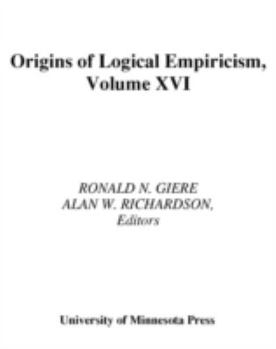Origins of Logical Empiricism
(Book #16 in the Minnesota Studies in the Philosophy of Science Series)
Logical empiricism remains a strong influence in the philosophy of science, despite the discipline's shift toward more historical and naturalistic approaches. This latest volume in the eminent Minnesota Studies in the Philosophy of Science series examines the main features of the intellectual milieu from which logical empiricism sprang, providing the first critical exploration of this context by authors within the Anglo-American analytic tradition of philosophy. These articles challenge the idea that logical empiricism has its origins in traditional British empiricism, pointing instead to a movement of scientific philosophy that flourished in the German-speaking areas of Europe in the first four decades of the 20th century. The intellectual refugees from the Third Reich who brought logical empiricism to North America did so in an environment influenced by Einstein's new physics, the ascension of modern logic, the birth of the social sciences as rivals to traditional humanistic philosophy, and other large-scale social, political and cultural themes. The contributors emphasize the connections among members of the logical empiricist movement as well as their connections with members of other major intellectual movements of the time. Focusing on the continuing influence of logical empiricism and the vitality of the issues with which its proponents struggled, this important volume provides valuable context to contemporary philosophers of science.
Format:Hardcover
Language:English
ISBN:0816628343
ISBN13:9780816628346
Release Date:October 1996
Publisher:University of Minnesota Press
Length:400 Pages
Weight:1.82 lbs.
Dimensions:1.2" x 6.3" x 9.3"
Customer Reviews
0 rating





